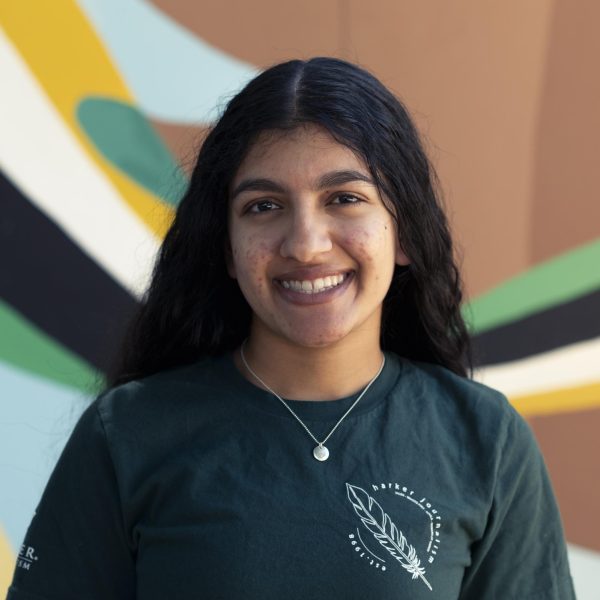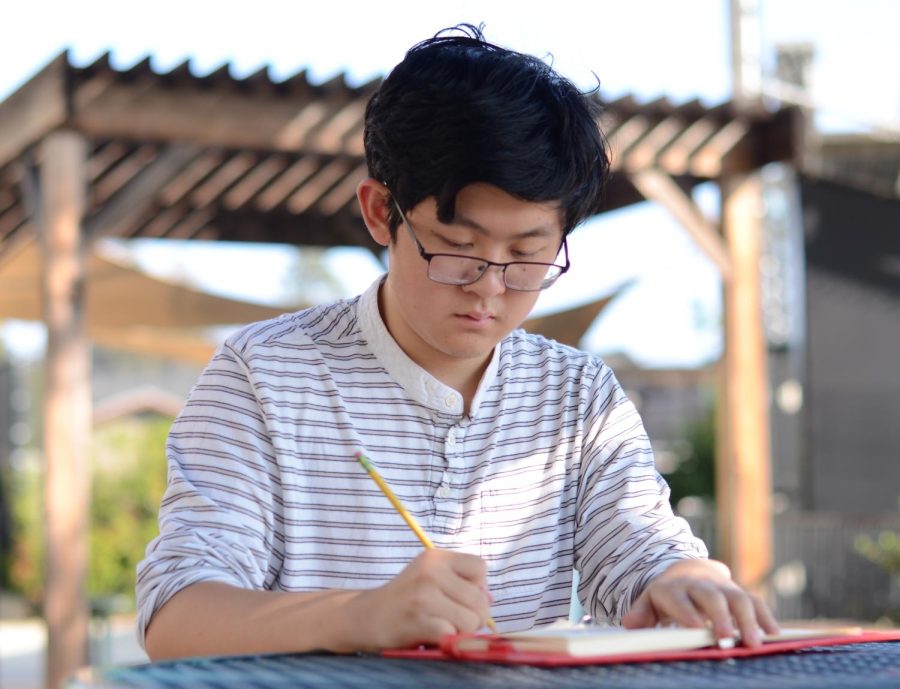Humans of Harker: Progress over perfection
Dyllan Han finds meaning through challenging norms and exploring the unknown
“My favorite conversations I’ve had with people involve us talking about something really vague that’s bothering them or that’s bothering me, or an argument that’s always vague. I find that the biggest utility I have in that conversation would be making this vague thing on their mind something tangible and understandable for them by articulating it well. I find myself writing about topics that I’ve talked about with other people, after listening to what they have to say and the problems that they have,” Dyllan Han (12) said.
The hedgehog’s dilemma. Kanye West. YouTube video essays. Karl Marx. To the normal eye, they have nothing in common, but to Dyllan Han (12), they are all connected. He takes each one, fascinating and complex, and forms pathways between them, synthesizing them into meaningful media, waiting to be consumed.
Dyllan aspires to help others discover the profound depths of art by forging distinctive connections between various mediums, from the latest Kendrick Lamar album “Mr. Morale & the Big Steppers,” to philosophical essays by Plato, to movies like “Everything Everywhere All at Once.”
“The most powerful way that people learn is by delving deep into a story, because it’s the next best thing to experience,” Dyllan said. “You are taking the place of a narrator, of a character in a story, and you’re going through these things and these events and relating to it. When the final conclusion comes and it has some thematic ending that might be clichéd, it’s not clichéd anymore, it’s not so simple. It’s something that really connects with you, because you’ve almost lived it.”
Dyllan also expresses his thoughts through poetry, where he focuses on fantasy while examining different ideas of philosophy, like love and death, as well as those related to social life, including gender roles and toxic masculinity. By sitting on these topics, Dyllan has reflected on the events of his own life and how they have shaped his perspectives.
“I used to have a conception of happiness as this thing that you work towards your whole life and achieve, and then you’re in this state of happiness,” Dyllan said. “Death has taught me generally that any sort of happiness won’t last. The biggest way that’s changed me is that I’ve stopped trying to be perfect. From a line perspective, I have started to prioritize making the slope of that line positive rather than making it super high. As long as I’m making that steady progress, I’m okay with that; as long as I’m improving, that makes me happy.”
Even today, Dyllan’s perspective continues to shift as he explores the unknown: as a senior, Dyllan chose to partake in the Congress event of speech and debate. Though new to the event and ranked lower than his fellow senior participants, Dyllan is still glad he chose to try something different.
“This year, I’ve also failed a lot,” Dyllan said. “I haven’t made it to the elimination rounds, quarterfinals, semifinals and any of them, but I see my speaking improving, and I find that I’m arguing better. If I am to rate myself beyond these achievements, I’m happy with that because I feel like I’m doing better, I’m becoming more well rounded and I’m progressing.”
Upper school speech coach Scott Odekirk, who has overseen Dyllan’s transition to Congress, expressed appreciation for his curiosity and receptiveness towards his peers throughout the process of learning. He admires Dyllan’s ability to step back into the position of being a student again, even after being successful in past categories and tournaments.
“His transition has been really interesting, because it has been really generous, the way that he, one of the most successful people in our team, has entered Congress and said, ‘Teach me, show me,’ rather than deciding that he knows,” Odekirk said. “This transition is really an example of his leadership because he is empowering people to participate.”
Close friend Mir Bahri (12), who has known Dyllan since sixth grade, recognizes the same persistence Dyllan has in speech in the other work he does.
“Every time you see him, he’ll always have a smile on his face,” Mir said. “He really cares about what he does, and if he has a minor setback, he still has a smile on his face. He’s still enthusiastic and cheerful and really works hard.”
Benjamin Tian (12) admires Dyllan’s ability to stay true to himself, regardless of the people who surround him and the pressure to conform to societal standards.
“I see him as someone who doesn’t care what people think a lot of the time,” Benjamin said. “[It’s] very admirable the way he is passionate, and he won’t shy away from something because it’s not the social norm.”
Through his poetry and forging of connections, Dyllan hopes to provoke his fellow peers and community to think deeper in conversation. He aspires to be a person that provides others with a place to talk through their thoughts and process different questions, while also learning from them and drawing inspiration for new poems.
“My favorite conversations I’ve had with people involve us talking about something really vague that’s bothering them or that’s bothering me, or an argument that’s always vague,” Dyllan said. “I find that the biggest utility I have in that conversation would be making this vague thing on their mind something tangible and understandable for them by articulating it well. I find myself writing about topics that I’ve talked about with other people, after listening to what they have to say and the problems that they have.”

Sidak Sanghari (12) is an Editor-in-Chief of Humans of Harker, and this is her fourth year on staff. This year, she looks forward to honor the Class of...


















![“[Building nerf blasters] became this outlet of creativity for me that hasn't been matched by anything else. The process [of] making a build complete to your desire is such a painstakingly difficult process, but I've had to learn from [the skills needed from] soldering to proper painting. There's so many different options for everything, if you think about it, it exists. The best part is [that] if it doesn't exist, you can build it yourself," Ishaan Parate said.](https://harkeraquila.com/wp-content/uploads/2022/08/DSC_8149-900x604.jpg)




![“When I came into high school, I was ready to be a follower. But DECA was a game changer for me. It helped me overcome my fear of public speaking, and it's played such a major role in who I've become today. To be able to successfully lead a chapter of 150 students, an officer team and be one of the upperclassmen I once really admired is something I'm [really] proud of,” Anvitha Tummala ('21) said.](https://harkeraquila.com/wp-content/uploads/2021/07/Screen-Shot-2021-07-25-at-9.50.05-AM-900x594.png)







![“I think getting up in the morning and having a sense of purpose [is exciting]. I think without a certain amount of drive, life is kind of obsolete and mundane, and I think having that every single day is what makes each day unique and kind of makes life exciting,” Neymika Jain (12) said.](https://harkeraquila.com/wp-content/uploads/2017/06/Screen-Shot-2017-06-03-at-4.54.16-PM.png)








![“My slogan is ‘slow feet, don’t eat, and I’m hungry.’ You need to run fast to get where you are–you aren't going to get those championships if you aren't fast,” Angel Cervantes (12) said. “I want to do well in school on my tests and in track and win championships for my team. I live by that, [and] I can do that anywhere: in the classroom or on the field.”](https://harkeraquila.com/wp-content/uploads/2018/06/DSC5146-900x601.jpg)
![“[Volleyball has] taught me how to fall correctly, and another thing it taught is that you don’t have to be the best at something to be good at it. If you just hit the ball in a smart way, then it still scores points and you’re good at it. You could be a background player and still make a much bigger impact on the team than you would think,” Anya Gert (’20) said.](https://harkeraquila.com/wp-content/uploads/2020/06/AnnaGert_JinTuan_HoHPhotoEdited-600x900.jpeg)

![“I'm not nearly there yet, but [my confidence has] definitely been getting better since I was pretty shy and timid coming into Harker my freshman year. I know that there's a lot of people that are really confident in what they do, and I really admire them. Everyone's so driven and that has really pushed me to kind of try to find my own place in high school and be more confident,” Alyssa Huang (’20) said.](https://harkeraquila.com/wp-content/uploads/2020/06/AlyssaHuang_EmilyChen_HoHPhoto-900x749.jpeg)



